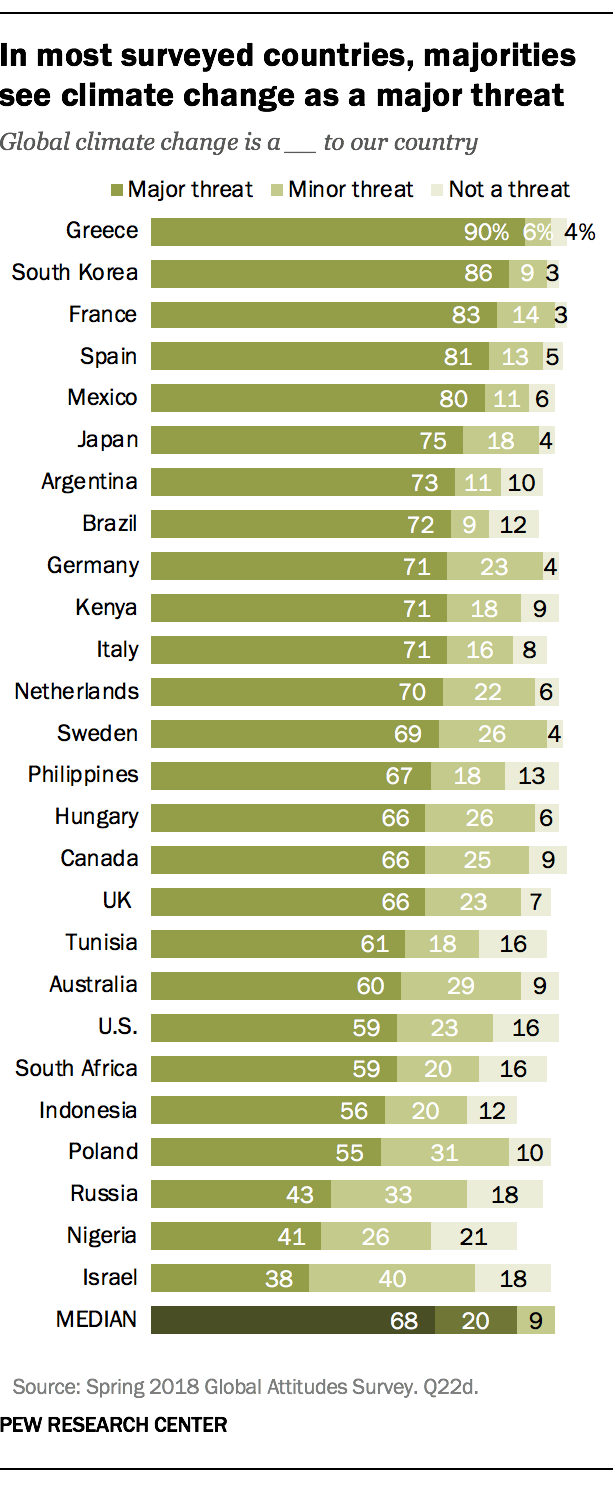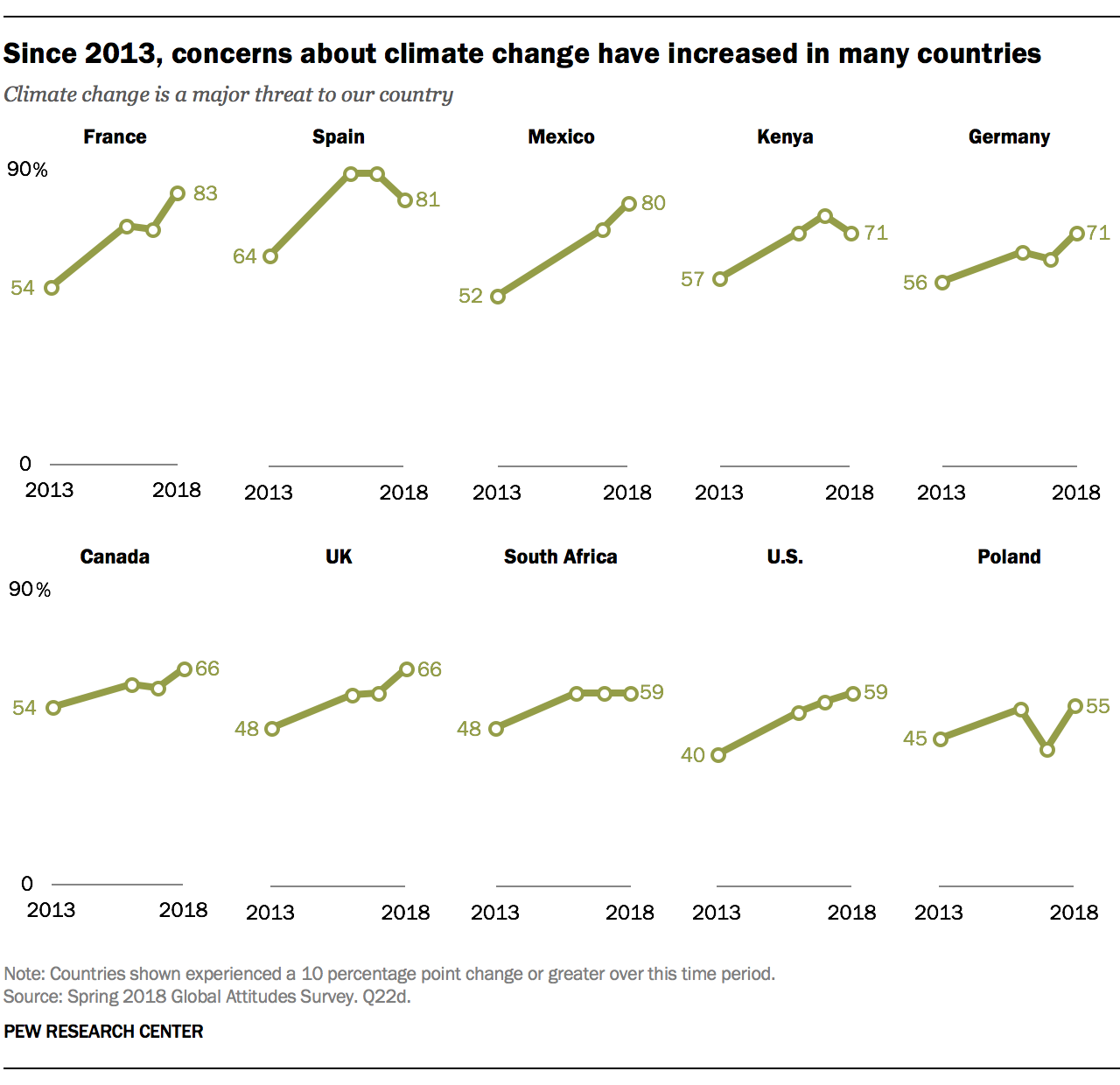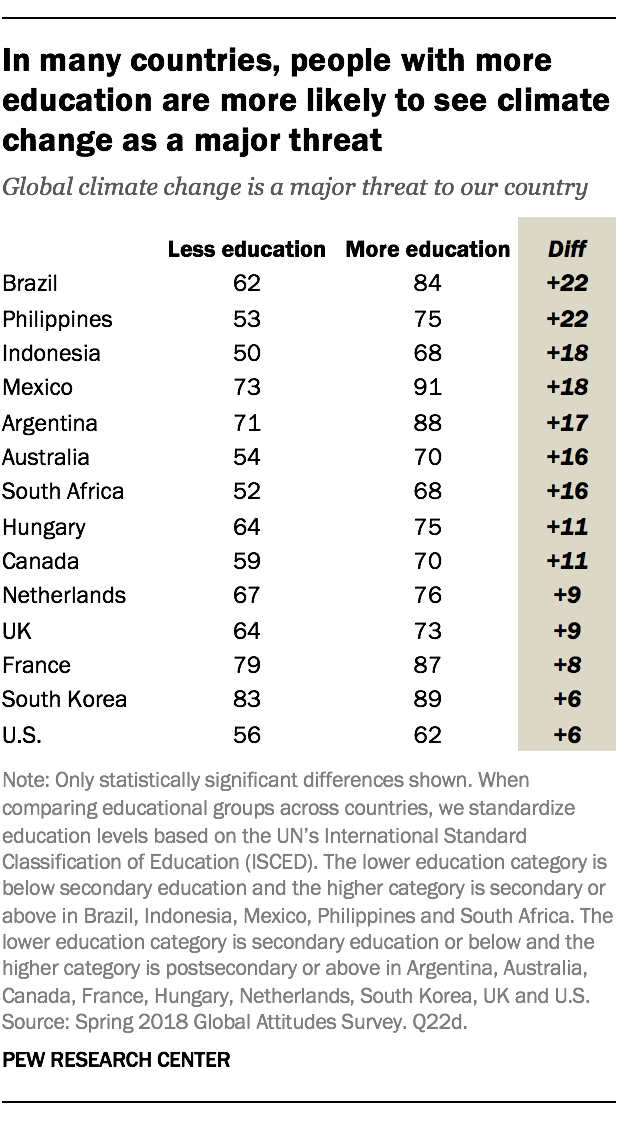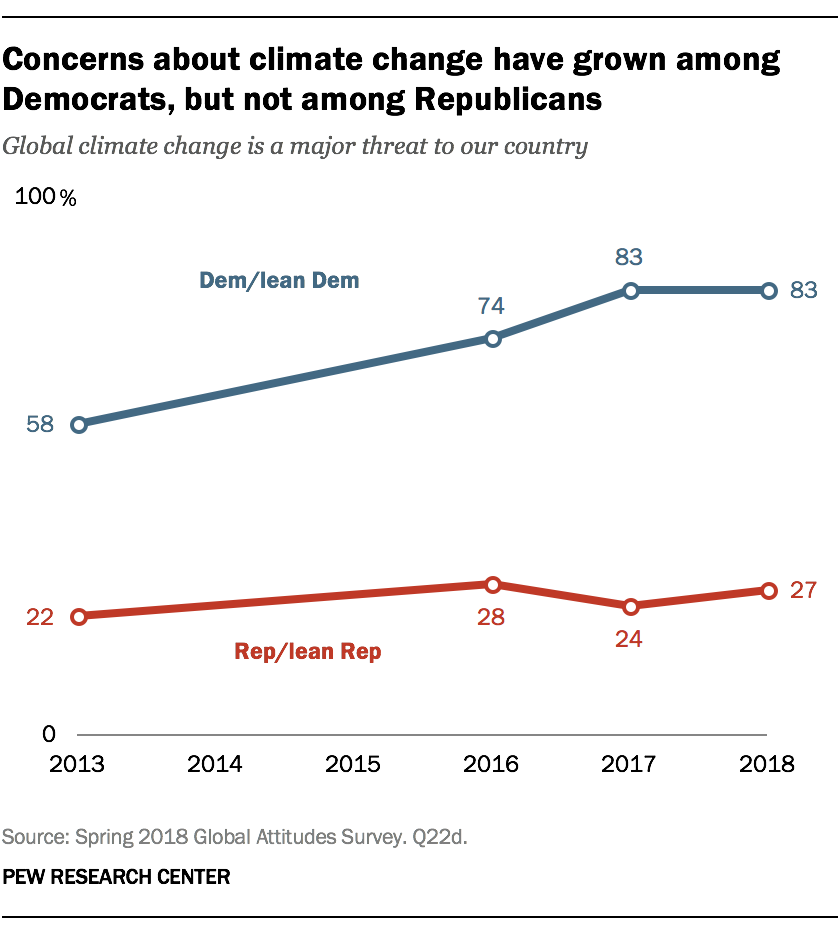what percentage of people feel responsible to help solve climate change

April 22 is World Twenty-four hour period, an annual consequence that highlights environmental concerns and encourages civic activity. This year's Globe Twenty-four hours comes amidst widespread global business organization about climate change.
Here are 5 facts well-nigh how people globally see climate change, drawn from a 2018 Pew Inquiry Center survey on how people evaluate 8 potential threats, as well every bit other polls conducted by the Centre. (For more than on how people in the U.s.a. see climatic change, see our companion postal service, "How Americans see climatic change in v charts.")
1  Majorities in most surveyed countries say global climate change is a major threat to their nation. In fact, it's seen as the peak threat in 13 of 26 surveyed countries, more than than whatsoever other event the survey asked about.
Majorities in most surveyed countries say global climate change is a major threat to their nation. In fact, it's seen as the peak threat in 13 of 26 surveyed countries, more than than whatsoever other event the survey asked about.
People in Greece express very high levels of concern, with 90% labeling climate modify a major threat (like to the 88% there who cite the status of the global economy). People in Republic of korea, France, Spain and Mexico also limited potent concerns. Eight-in-ten or more in each of these countries say climatic change is a major threat.
Americans are less likely to be concerned near climate change, with 59% seeing it as a serious threat. Most every bit many people in the United States cite climate change as signal to ISIS (62%) and North Korea'south nuclear program (58%). Americans most frequently cite cyberattacks every bit a major threat.
People in Russia (43%), Nigeria (41%) and Israel (38%) are the to the lowest degree likely to say climate change is a major threat to their nation.
2Substantial shares see climate change as a minor threat or not a threat at all. Non all people in the surveyed countries consider climatic change to be a major threat. A median of 20% across these countries consider global warming a pocket-size threat, while 9% say information technology is non a threat.
Most half or more in State of israel and Russia say global climate change is a small threat or not a threat (58% and 51%, respectively). In the U.Due south., roughly a quarter (23%) believe climate change is a minor threat, while 16% say it is no threat at all.
3Concerns almost climatic change have risen significantly in many countries since 2013. The share of people expressing business concern about the threat of climate change around the world has grown since 2013, when Pew Research Middle first asked respondents whether they meet information technology every bit a major threat to their nation. In 2013, a median of 56% in 23 countries said climate change was a major threat; in the Heart's most recent Global Attitudes survey, a median of 67% in the same countries hold this view. And in ten countries, the share of people who see global warming equally a major threat has grown by at least 10 percentage points. For case, 83% of people in French republic say this, up from 54% in in 2013, an increment of 29 points. Mexico has seen a like increase, from 52% to 80%, or 28 points.
 Americans accept also grown more concerned about climate change, even if their overall level of concern is lower than in some other countries. Virtually six-in-ten Americans see climate modify as a major threat (59%), upward xix points from 2013.
Americans accept also grown more concerned about climate change, even if their overall level of concern is lower than in some other countries. Virtually six-in-ten Americans see climate modify as a major threat (59%), upward xix points from 2013.
4  People with more education tend to be more concerned about climatic change; in some countries, women and younger people are as well more than concerned. Teaching, gender and age are related to evaluations of climate change as a threat. In well-nigh countries surveyed, those with college levels of education are more likely than those with less teaching to meet climate change as a serious threat. For instance, Hungarians with a postsecondary or higher education are eleven percent points more likely than their less-educated counterparts to say that climate change is a major threat. Women are more than likely than men to exist concerned about climate alter in 9 of the 26 surveyed countries. In Canada, for example, 72% of women consider climate change a major threat, compared with 59% of men. Age is also associated with views of climate modify in some countries. In the U.Due south., 71% of those ages 18 to 29 say climate change is a threat, compared with half of Americans 50 and older.
People with more education tend to be more concerned about climatic change; in some countries, women and younger people are as well more than concerned. Teaching, gender and age are related to evaluations of climate change as a threat. In well-nigh countries surveyed, those with college levels of education are more likely than those with less teaching to meet climate change as a serious threat. For instance, Hungarians with a postsecondary or higher education are eleven percent points more likely than their less-educated counterparts to say that climate change is a major threat. Women are more than likely than men to exist concerned about climate alter in 9 of the 26 surveyed countries. In Canada, for example, 72% of women consider climate change a major threat, compared with 59% of men. Age is also associated with views of climate modify in some countries. In the U.Due south., 71% of those ages 18 to 29 say climate change is a threat, compared with half of Americans 50 and older.
five  In the U.S., there's a wide partisan gap about climate change. Amidst American adults, Republicans and Republican-leaning independents are less likely than Democrats and Democratic leaners to express concern about climate change. Roughly a quarter (27%) of Republicans say climate change is a major threat, compared with more than than three-quarters of Democrats (83%) – a 56 percentage point difference. Democrats have also grown more worried about climate change since the question was first asked five years ago, while Republican opinions on climate have remained roughly the same.
In the U.S., there's a wide partisan gap about climate change. Amidst American adults, Republicans and Republican-leaning independents are less likely than Democrats and Democratic leaners to express concern about climate change. Roughly a quarter (27%) of Republicans say climate change is a major threat, compared with more than than three-quarters of Democrats (83%) – a 56 percentage point difference. Democrats have also grown more worried about climate change since the question was first asked five years ago, while Republican opinions on climate have remained roughly the same.
This tendency is consistent with wide and growing political divides amidst Americans on a range of beliefs about climate issues.
Moira Fagan is a inquiry analyst focusing on global attitudes research at Pew Research Center.
Christine Huang is a research analyst focusing on global attitudes at Pew Research Heart.
joyalsarronever78.blogspot.com
Source: https://www.pewresearch.org/fact-tank/2019/04/18/a-look-at-how-people-around-the-world-view-climate-change/
0 Response to "what percentage of people feel responsible to help solve climate change"
Post a Comment